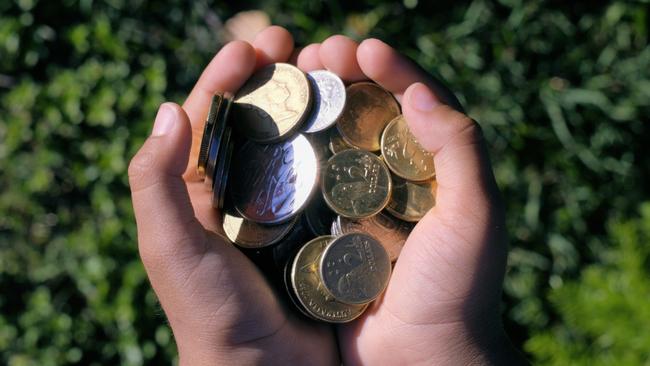Feeling financial stress? Follow Barefoot Investor’s three steps
The cost of living crisis is causing huge stress for many Australians so here’s what Scott Pape suggests you should do to relieve the financial pressure.
Barefoot Investor
Don't miss out on the headlines from Barefoot Investor. Followed categories will be added to My News.
If you’re stressed about your money right now, you’re not alone.
Australians’ mental health is actually in worse shape now than during the Covid lockdowns, according to a new study by KPMG and Smiling Mind.
Our biggest source of stress?
The rising costs of practically everything … especially interest rates.
Here’s the thing: when it comes to our mental health, Australians are good at asking for help. We are, after all, the second largest users of antidepressants in the world.
Yet when it comes to dealing with money stress?
Not so much.
But ignoring things won’t make it any better … nor will doom-scrolling. The only thing that’s guaranteed to get you back in control is for you to take action.
So let me give you three action items you can do right now.
The first action item is to pick up your phone, google MoneySmart’s ‘Mortgage Calculator’ and see what your repayments would be if interest rates went up another 2%.
(Hang on, why 2%? Because the bulk of the senior bank economists predict rates will rise 1.5% over the next 12 months. Having said that, these are the same guys who all once famously lost a financial forecasting contest with my golden retriever … so let’s be conservative.)
Write down what your monthly repayment would be, and then … act as if it’s this figure already.

Get into a bit of role-play for the evening:
What would you have to do to meet your repayments?
Then check your home loan. Here are some numbers: the average variable rate is 4.55% … or 5.10% if you’re with one of the big banks (but why would you be?). If you have more than 20% equity in your home, you should call up your bank and bitch (rather than go through the hassle of switching). A good variable rate to demand is 3.5%. Do that and you’re three-quarters of the way there.
The second action item is to review your spending.
Disclaimer: I’ve never stuck to a budget in my life, so I’m afraid I can’t help you with a rigid spreadsheet. Instead, I’d suggest that you review your Barefoot Buckets and spend consciously … which means be lavish on things you love and use a lot (hello Dunlopillo) and vicious with anything you don’t (goodbye Netflix).
The third and final action item – regardless of whether or not you have a home loan – is to get a payrise. Yes, I know the thought of asking for more money probably makes you feel a little queasy, but this is a total non-negotiable. Besides, everyone else is doing it. With inflation burning through 7% of your wallet this year, you need to get at least that much of a payrise, or you’ll be going backwards.
So there you have it: three practical, positive and empowering action items that you can do right now to take back control of your money. Let me know how you go!
Tread Your Own Path!
TINY HOUSE, BIG DREAMS
Hi Barefoot,
In light of the current housing crisis, my partner and I are looking into buying a ‘tiny house’ to live in. We believe this will allow us to live without the stress of a huge mortgage or crazy high rent. We would initially look at renting land from someone while paying the tiny house off, and then eventually sell the tiny house and buy our own land when our needs change. What do you think about tiny house living?
Lucy

Hi Lucy,
I’ve changed my mind on tiny house living. My wife and I lived in a Winnebego with four kids for five months and we loved it. However, if we were still living tiny today I’m quite sure I’d be in a mental asylum right now. In other words, what made it fun was that it had a time limit. I don’t know many people who live their entire life in a tiny house … and very few families could do it long term.
So what do I think?
I think you need to work out where you want to be eventually. Is it in a home on land? If that’s the case, the only reason you’d buy a tiny house is if it were dramatically cheaper than renting. After all, your house is on wheels so it’s going to lose money over the long term.
ROBBING PETER TO PAY PAUL
Dear Scott,
My husband is not putting his money where his mouth is. He runs his own business and is the sole breadwinner for our family. We have read your book and set up buckets with our income going into mortgage, daily expenses and splurge. This year his business has been slower and the percentage going into our mortgage has not covered the monthly repayments. On top of this, I have discovered he hasn’t been putting the percentage we agreed upon into the mortgage and has instead been skimming it into our daily expenses.
If the mortgage isn’t paid each month, I want to know about it! And I definitely want to be involved in any decisions about ‘robbing Peter to pay Paul’. How do I make sure the money goes where we have agreed it should?
Wendy

Hi Wendy,
I want you to re-read the first two sentences of your question.
(Go on, have a read, I’ll wait.) It’s kind of … gruff.
Is that the same tone and approach you use with your husband? If so, that may be part of the problem. (After all, it’s not like he’s siphoning off the cash to blow on wizz fizz and hokey-pokey.) Wendy, like it or not, you’re a small business family, and he needs to know that you’ve got his back. Here are a couple of suggestions on what you can do together:
Set up buckets for the business – especially for paying tax and suppliers. Separating the business from your personal finances is really important. Ultimately, the business needs to pay at least as much as he’d get working for someone else; otherwise, what’s the point?
Once you have your buckets set up, and a clear picture of what the break-even earnings of the business are, work together to set some sales goals over the next year.
Finally, if things get really tough, call the Small Business Debt Helpline (sbdh.org.au, 1800 413 828). They’re experts. They’re confidential. And they’re free.
THE HARD ROAD
Hi Scott,
Five years ago my brother died of cancer, then a month later my fiance of six years left me – after he had finished spending the last of my savings (he was a drug addict and terrible with money). I was a 29-year-old woman making a starting wage of $16 an hour, struggling to get back on my feet. Then a year later a workmate recommended your book, and it changed my life. Fast forward to today and I have paid off all my debts and have a combined $50,000 in shares and cash. I come from a very poor family that always struggled financially, so I feel like a millionaire in comparison to my previous life. Words can’t convey how grateful I am. Thank you for changing my life!
Tanya

Hi Tanya
You’ve walked a hard, lonely road: death, debt, heartbreak and betrayal … but you’ve made it. I’ll let you in on a little secret: you probably feel better than most millionaires, because research has found that money only gives you a short-term sugar hit.
It doesn’t make you happier over the long term (even though we all think it does). Yet what you’ve achieved on your own has built your self-confidence and transformed the way you look at the world – and that is truly life-changing.
You Got This!
Information and opinions provided in this column are general in nature and have been prepared for educational purposes only. Always seek personal financial advice tailored to your specific needs before making financial and investment decisions
The Barefoot Investor for Families: The Only Kids’ Money Guide You’ll Ever Need
(HarperCollins) RRP $29.99
If you have a money question, email scott@barefootinvestor.com.
More Coverage
Originally published as Feeling financial stress? Follow Barefoot Investor’s three steps



